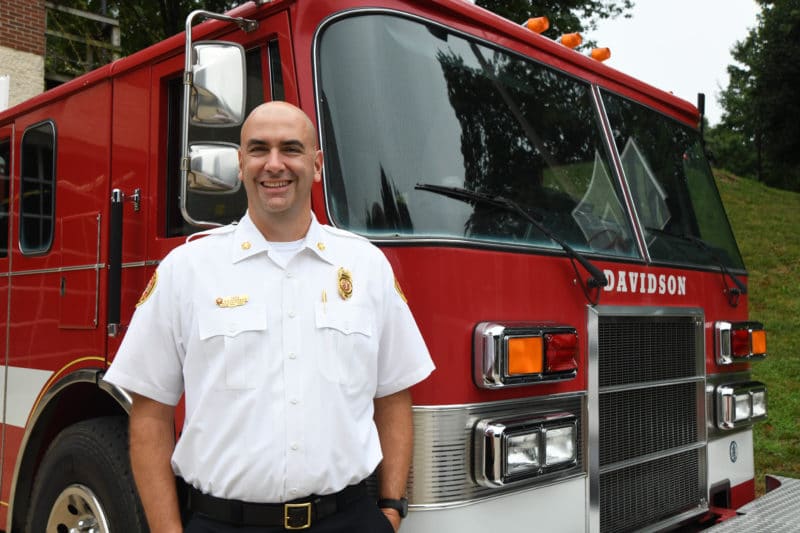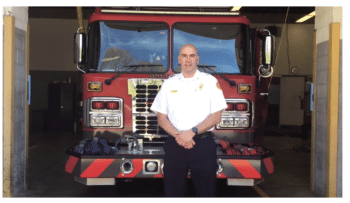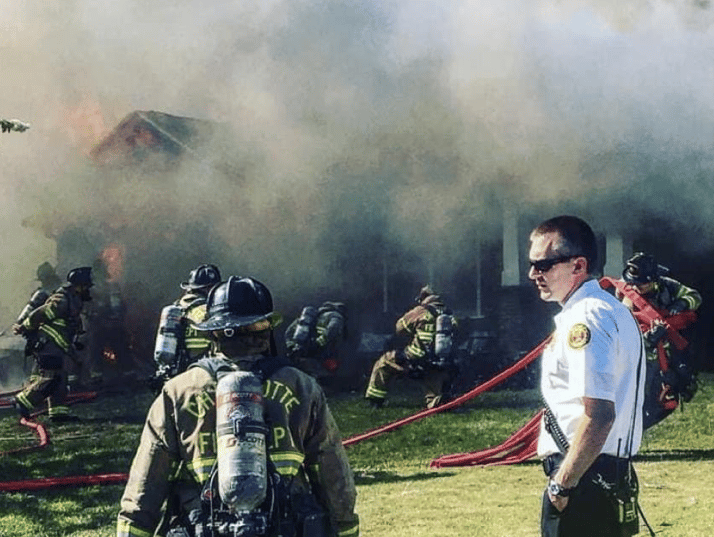NEWS
Alum First-Responders Lead and Serve on the Front Lines Every Day
by Press Release | Sep 14, 2022 | Local, News

Former Davidson Fire Chief Bo Fitzgerald
The college recently published an article about alumni first responders. Two of those alumni have served as first responders in our town. News of Davidson is sharing the portion of the article focused on our local first responders.
Their education at Davidson taught them how to deal with the unexpected–and they’ve had plenty of that on the front lines of emergency response in the last two years as waves of pandemic swept the nation, wildfires imperiled the arid West and ever-more powerful hurricanes raked the Southeast.
A few graduates find themselves at the vanguard of catastrophe, working in fire service, medical response and even in the battle against global climate change.
While their career paths might not match those typically associated with Davidson grads, their brand of “leadership and service” distinguishes them during a particularly perilous era of recent history. Their work is a matter of life and death.
Here are some (two) of their stories:

Bo Fitzgerald – Class of ’99
Bo Fitzgerald
Climbing the ladder to ever-more complicated challenges
Only days after Bo Fitzgerald was promoted to division chief at the Charlotte Fire Department, COVID-19 attacked the force. His first day in the new job, eight firefighters comprising two fire companies were sidelined by the pandemic.
“And it just got worse from there,” said Fitzgerald, a 1999 history graduate. And as quarantines rose, the city was soon swept with protests over the George Floyd killing in Minneapolis by police.
“So right out of the gate, we had two major events which would have a lasting impact not only on my profession, but on the entire nation.”
Charlotte lost a firefighter to the virus in 2021 and several department members have become seriously ill.
“It has also had a severe impact on our day-to-day jobs,” said Fitzgerald. “It has negatively impacted our staffing. It has added to our firefighters’ workload. And I have witnessed what I believe to be a significant impact on our mental health.”
As one of seven division chiefs in the nation’s 15th largest city, Fitzgerald supervises nine battalion chiefs, who together manage more than 300 captains and firefighters. While he still responds to major incidents on his watch, his days are largely consumed by critical administrative tasks, things like staffing to personnel issues.
He also coordinates special-event coverage, assigning firefighters and EMTs to cover Carolina Panthers NFL games, city festivals and other events.
“And I’ll just go ahead and say it–none of this is as much fun as riding on a fire engine.”
Fitzgerald joined Davidson’s volunteer fire department as a student, and got hooked on the profession. He worked for six months as an emergency medical technician in Mecklenburg County and joined Charlotte Fire six months later.
Even then, on his days off, he continued to volunteer in Davidson, where his wife Adah ’01 runs one of the town’s most popular businesses, Main Street Books. Fitzgerald was appointed the part-time fire chief for Davidson in 2015 and he held the post for five years.
As a history major with a minor in religion, Fitzgerald followed an atypical post-graduate path.
“Although both degrees come in handy for dinner table conversations at the fire station every now and then, my field of study while at Davidson never really seemed to help much at fire scenes,” he said. But plenty he learned in his four years continues to pay off, like critical and independent thinking skills. And reflecting candidly on mistakes and turning those into positives.
“And the more I’ve progressed in my career, the more all of that stuff has mattered,” he said. “Not to mention the personal relationships from college that have been extremely influential over the years.”
David Farnum
Recognizing the complex dynamics of an urban safety net

David Farnum at a fire in Charlotte
David Farnum came to Davidson as a Bonner Scholar, a program with a significant service obligation. Farnum served much of that with the Davidson Fire Department, and he still remembers, nearly a quarter-century later, fighting his first fire. He was one of three Davidson students with two veterans dispatched to a burning mill house.
The first time someone goes into a fire, he said, they know whether it’s for them or not. “They know at that moment amidst the heat, smoke and controlled chaos,” said Farnum. And while his job has changed, it’s still about people.
“It’s about those we work with,” he said. “It’s about the citizens, providing excellent, equitable service.”
Now instead of responding to calls dozens of times a day as he did for years, “my job is to make sure that those I have the privilege of leading are trained and equipped to respond quickly and effectively.”
He is one of seven division chiefs in the Charlotte Fire Department (hold on to your helmet: yes, two at this high rank are Davidson grads). It’s a major urban department in one of America’s fastest-growing cities. It covers 316 square miles (nearly three times what the Atlanta Fire Rescue agency covers) with more than 250 people on duty a day. He goes to every major incident in the city of nearly 900,000.
While Farnum has seen an uptick in public appreciation for the work of first-responders during the pandemic, he wishes the public had a better understanding of the broader social challenges communities face.
He sees the city’s problems from a street-level view, and since COVID hit, he’s seen them magnified.
“Community resilience is fragile or fractured right now,” Farnum said. Gaps in Charlotte’s social safety net have grown wider.
“COVID has pushed a lot of people into crisis,” he said, such as fear of eviction after jobs are lost. “Problems are not necessarily managed in a comprehensive way, and the community need is so great. About 450 times a day we roll out to fires, EMS runs, technical rescues and hazardous materials incidents. We address that immediate, acute need. We solve a problem and take great pride in doing so.” But, he said, the more extensive, comprehensive challenge is one that continues to vex him.
As a manager in a complex organization, he draws on lessons he learned from Davidson.
Farnum is an English grad who, for a couple of years between operations roles, found himself leading his agency’s predictive analytics unit. An odd fit? Nope. An advantage.
Davidson taught him not to be intimidated by hard questions with no clear answers.
“My primary role in the department for a couple of years was to drive innovation and problem-solving, while maintaining focus on long-term strategy, making sure that senior leadership had the information it needed to make well-informed decisions by tying disparate information together,” he said. “Making some of those key decisions now, and managing complex conversations and discussions, speaking to the ‘why’ by answering difficult questions directly, it all ties back to what I originally found myself doing at Davidson.”
And it ultimately ties back to the people.
“Over the last few years, like many senior leaders, I’ve had what amounts to a pretty obvious realization–that one of the only ways to ensure the projects and processes I’ve been a part of continue are to move to staff advocacy, active succession planning and to be a mentor. This means trusting those I work with, developing and empowering them.”
Regarding the agency’s accreditation process, for instance, he has expanded what, historically, had been limited participation into comprehensive team projects, where each member contributes to the development of each part of every accreditation document. For these and other complex problems he sees on the job, Farnum said he places his faith in people–people who will take up the torch (or should we say the nozzle?) and walk it forward.


